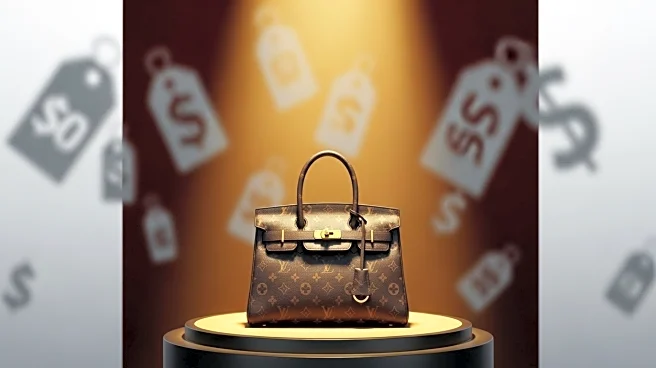What's Happening?
U.S. tariffs of 15 percent on imports from the European Union are impacting luxury brands, leading to increased consumer interest in the secondhand market. Resale platforms are experiencing stable demand as shoppers seek more affordable alternatives to new luxury items. Brands like Hermès, Louis Vuitton, and Chanel have raised prices, further driving consumers towards pre-owned goods. Analysts note that the secondhand market remains healthy, with stable average selling prices despite inflationary pressures. Resale platforms like Vestiaire Collective and Fashionphile report increased activity, with consumers buying and selling in response to market changes.
Why It's Important?
The shift towards secondhand luxury goods highlights changing consumer behavior in response to economic pressures. As tariffs and price hikes make new luxury items less accessible, the resale market offers a viable alternative, maintaining consumer engagement with luxury brands. This trend benefits resale platforms, which can capitalize on the growing pricing gap between new and pre-owned items. Economically sensitive consumers are adapting by opting for pre-owned goods, ensuring continued participation in the luxury market. The resilience of the secondhand market underscores its potential to thrive amid economic uncertainty.
What's Next?
Resale platforms are poised to capture further market share as tariffs continue to impact retail pricing. The ongoing economic environment may encourage more consumers to sell luxury goods, increasing supply for eager buyers. As new collections from major fashion houses debut, resale interest is expected to spike, potentially boosting demand for both current and vintage items. Platforms may also explore strategic campaigns to attract value-driven buyers, leveraging the appeal of vintage luxury goods at competitive prices.
Beyond the Headlines
The growth of the secondhand luxury market raises questions about sustainability and consumer ethics. As shoppers increasingly turn to pre-owned goods, the industry may see shifts in production practices and brand strategies. The focus on authenticity and access in the resale market could drive broader changes in how luxury brands engage with consumers, emphasizing transparency and value. Additionally, the trend may influence cultural perceptions of luxury, redefining notions of exclusivity and ownership.









